Business Agreement Letter Between Two Companies
Dear [Company Name],
I am writing to formalize our business agreement as discussed in our recent meeting. We, [Your Company Name], are pleased to enter into a business agreement with [Other Company Name], with the aim of achieving mutually beneficial outcomes for both our companies.
As agreed, [Other Company Name] will provide [service/product], while [Your Company Name] will provide [service/product]. Both parties have agreed to adhere to the following terms and conditions:
Scope of Services: [Other Company Name] will provide [service/product], while [Your Company Name] will provide [service/product] as detailed in the attached document.
Payment Terms: [Other Company Name] will invoice [Your Company Name] at the agreed-upon rates for services/products provided. Payment will be made within [Number of days] days of receipt of invoice.
Confidentiality: Both parties agree to maintain the confidentiality of any information exchanged during the course of this agreement.
Termination: Either party may terminate this agreement upon [Number of days] days written notice to the other party.
Intellectual Property: Any intellectual property created as part of this agreement will be jointly owned by both parties, with each party having an equal share.
Representations and Warranties: Both parties represent and warrant that they have the authority to enter into this agreement, and that the services/products provided will be of the highest quality.
Governing Law: This agreement will be governed by and construed in accordance with the laws of [State/Country].
Entire Agreement: This agreement represents the entire understanding between both parties and supersedes any prior agreements or understandings, whether written or oral.
We are looking forward to a successful partnership with [Other Company Name]. Please sign below to indicate your agreement to the terms and conditions outlined in this agreement.
Sincerely,
[Your Name]
[Your Company Name]
Agreed to and Accepted by:
[Other Company Name]
Signature: _________________________
Print Name: ________________________
Title: ____________________________
Date: ____________________________
Business Agreement Letter Between Two Companies
This Agreement ("Agreement") is entered into on this day (______) by and between: _____________ duly established and operating in ______ under the [license] issued by the Department of Economic Development and having an address at P.O. Box No.______, represented herein by its CEO, _________ (hereinafter referred to as the "First Party");
And
____________, a Limited Liability Company duly established and operating in _____ under the License No. xxxxxxxx issued by the Department of Economic Development and having an address at ___________ represented herein by its Group CEO, ____________ (hereinafter referred to as the "Second Party").
The First Party and the Second Party shall hereinafter be collectively referred to as the "Parties".
The Parties mutually agree that:
1.Scope of Services
The Second Party shall provide the following services to the First Party:
1.1Service 1
1.2Service 2
1.3etc.
2.Second Party Remuneration
2.1.For clause, 1.1 above the Second Party will charge a monthly fee of _______ for the Scope of Work specified in Appendix 1 of this Agreement.
2.2.Any reasonable third party production costs shall be charged at the actual cost plus a mark-up of 5%, provided First Party gives prior approval in writing to the incurring of such costs.
2.4.Travel costs (outside of usual in-city ground transportation), if any, are not covered in the above fee and will be charged at actual costs, and all such travel must be approved in writing in advance by the First Party.
3.Payment Terms
3.1.The Second Party will submit the invoice for the monthly Fee invoice at the beginning of each month.
3.2.The First Party shall process the payment of Fee within 30 days of receiving the invoice.
3.3.If advance payment is required to be made to any supplier in relation to the proper supply of the Services, then the First Party will make such payments in advance to the Second Party prior to the implementation of the job. In all cases the Second Party will invoice the First Party after getting approvals for the same.
4.Term of the Agreement and Effective Date
4.1.This Agreement is effective from _______ to _________ for a period of 12 months
4.2.Upon successful completion of six months, a review meeting will be conducted where the parties may choose to revise the retainer fees.
4.3.Upon end of this Agreement, the First Party shall pay all outstanding invoices and sums due to Second Party in relation to the performance of Services already performed by Second Party.
5.Duties, warranties, and covenants of the Second Party:
5.1.The Second Party hereby warrants that it is fully capable of executing all the Services in connection with this Agreement and it shall perform the Services as set out in this Agreement with due and careful attention, diligence, in a competent and proactive manner and in accordance with international best practices for the provision of such Services. The Second Party must not arrange for the publication of any material in relation to the Brand without the prior written approval of the First Party, in accordance with the process set out in clause 5.2.
5.3.The Second Party will advise the First Party immediately of any changes in the estimated cost of any items or any changes in plans, schedules or work in progress previously approved in writing by the First Party.
5.4.The Second Party shall not represent itself or hold itself as an agent of the First Party.
5.5.The Second Party shall not assign, transfer or delegate its obligations under this Agreement to a third Party.
6.Force Majeure
6.1."Force Majeure" shall mean unforeseen events, which occur after the signing of this Agreement and which are beyond the reasonable control of the Parties including but not limited to strikes, blockade, war, mobilization, revolutions or riots, natural disasters, in so far as such an event prevents or delays the affected Party from fulfilling its obligations.
6.2.Any delay occurring in the deliveries of any third party supplier(s) shall be regarded as Force Majeure only if such delay has been caused by events defined in Clause 6.1 mentioned hereinabove.
6.3.The Party affected by Force Majeure shall immediately take reasonable steps to limit or minimize the consequences of such Force Majeure.
6.4.The Party claiming force majeure shall inform the other Party in writing and without delay of the force majeure, at the time it begins and its probable duration. Performance of any obligation affected by Force Majeure will resume as soon as practicable after the termination of the Force Majeure event. The end of the force majeure shall also be reported in writing.
7.Ownership and Intellectual Property Rights and Trademark
7.1. All the contents and materials placed and available shall be the sole property of the First Party.
7.2.The parties agree that all intellectual property rights in and relating to all materials that are created by the Second Party as a result of the provision of the Services (the "Materials") will be the property of First Party. To the extent required, the Second Party assigns all rights in and relating to the materials to the First Party.
7.3.The Second Party agrees that it is not entitled to obtain an injunction or otherwise restrain the Second Party from exploiting any rights in and to the Materials, or from exploiting the Materials, for any reason.
7.4.The Second Party will undertake to ensure that the Services supplied to, and Materials provided on behalf of, the Second Party by the First Party and their representatives are done in compliance with applicable laws.
7.5.The Second Party must, during the Term, maintain appropriate insurance, if required by law, and to, maintain any applicable licenses for the rights to operate as a business.
7.6.The Second Party admits and acknowledges that it shall not use the trademarks of the First Party for any other purpose other than for the provision of the Services. Save as aforesaid, the Second Party shall not use the said trademark and the other documents for any other purpose whatsoever.
7.7.The Second Party can use the trademarks of the First Party as part of its marketing portfolio after obtaining prior written approval from the First Party.
7.8.The Second Party acknowledge that the information relating to the Services mentioned in the Agreement shall be kept confidential and it shall not use or disclose the same to the third Party and shall take all the necessary steps to preserve in all respects such confidentiality.
7.9.The First Party’s trademark and any other documents including any databases, software, programming provided by the First Party to the Second Party for use by the Second Party for the performance of the Services hereunder, shall remain the absolute property of the First Party.
8.General Indemnity
8.1.The Second Party shall hold harmless, and indemnify the First Party, its directors, officers, agents and employees against any and all losses, liabilities, damages or expenses, including any direct, indirect or consequential loss, liability, damage, or expense, as a result of or in connection with:
Any alleged or actual infringement of any third party's Intellectual Property Rights or any other rights arising out of the use or supply of the Services by the Second Party; or any liability, loss, damage, injury, cost or expense sustained by the First Party, its employees or agents or by any customer or third party to the extent that such liability, loss, damage, injury, cost or expense was caused by, relates to or arises from the provision of the Services of this Agreement or otherwise as a consequence of a direct or indirect breach, negligence, failure or delay in performance of the Services under this Agreement by the Second Party.
9.Governing Law
9.1.This Agreement is constructed and shall be governed by the laws in force in the _________. The _______ courts shall have exclusive jurisdiction over any dispute arising from or in connection with this Agreement.
10.Notices
10.1. Any notice required or permitted to be given under this Agreement shall be by written communications by way of courier, or by personal delivery, and shall be directed by one party to the other at its respective address as mentioned above with a copy to the then-current email address of the CEO of the other Party.
10.2. Either party may change its address to which notices or requests shall be directed by written notice to the other party, but until such change of address has been received any notice or request sent to the above addresses shall be effective and shall be considered as having been received.
11.Termination
11.1.Either party can terminate this agreement for convenience with a written notice of 2 months’ time.
11.2.Either Party may terminate this Agreement immediately without the need for a Court order, on notice, if the other breaches this Agreement and such breach is not capable of remedy or if capable of remedy, is not remedied within 14 days of receiving written notice from the other Party specifying that the notifying Party has the right to terminate under this clause if the breach is not remedied. On such termination the First Party shall pay all the charges for the work done and due to the Second Party up to the date of termination including charges for irrevocable commitments made by the Second Party in relation to the period after the date of termination (provided such commitments were authorized by the First Party)
12.Local & Indirect Taxes
All the retainer fees, 3rd party expenses and agency administrative expenses referred to in this agreement are exclusive of any indirect taxes (VAT) levied by the local Government. An additional 5% VAT will be imposed on all the invoices as per the VAT regulation. If the government or any competent authority, during the period of the contract introduces any additional taxes or levies, those will be added to the fee.
IN WITNESS WHEREOF the Parties hereto have executed this Marketing Communications Support Agreement on the date first above written.
For and on behalf of the First PartyFor and on behalf of the Second Party
_______________________ _________________________
CEO Group CEO
Witnesses:
1.__________________________2._____________________
Partnership Agreement Letter
Subject: Partnership Agreement Proposal
Dear [Partner Company Name],
We are writing to formalize our interest in establishing a strategic partnership between [Your Company Name] and [Partner Company Name]. After thorough discussions between our teams, we believe that combining our respective strengths will create significant value for both organizations.
This letter outlines the key terms of our proposed partnership: [specific terms, revenue sharing, responsibilities, duration]. We propose that [Your Company] will contribute [resources/expertise], while [Partner Company] will provide [resources/expertise]. The partnership will commence on [date] and continue for [duration], with provisions for renewal upon mutual agreement.
We have attached a detailed partnership agreement draft for your review. We welcome any suggestions or modifications you may wish to propose. Please review the terms and indicate your acceptance by signing and returning this letter by [deadline].
We look forward to building a mutually beneficial relationship that drives growth and innovation for both our companies.
Sincerely,
[Your Name]
[Your Title]
[Your Company Name]
Joint Venture Agreement Letter
Subject: Joint Venture Proposal for [Project Name]
Dear [Company Representative],
Further to our recent meetings, [Your Company] is pleased to propose a joint venture with [Partner Company] to pursue [specific project/opportunity]. We believe this collaboration will leverage our combined expertise and resources to achieve objectives that neither company could accomplish independently.
The proposed joint venture structure includes: equal equity participation (50/50), shared management responsibilities, and proportional profit distribution. Each company will contribute [specific contributions: capital, technology, personnel, etc.]. The venture will operate as [legal structure] with a dedicated management team comprising representatives from both organizations.
Key milestones include: project initiation by [date], operational launch by [date], and anticipated break-even by [date]. We estimate total investment requirements of [amount], to be funded equally by both parties.
We have prepared comprehensive documentation including financial projections, operational plans, and legal framework. We propose meeting on [date] to discuss this proposal in detail and address any questions.
Please confirm your interest and availability for further discussions.
Best regards,
[Your Name]
[Your Title]
[Your Company]
Non-Disclosure Agreement Letter
Subject: Non-Disclosure Agreement - Confidential Information Exchange
Dear [Recipient Company],
As we prepare to enter discussions regarding [purpose: potential partnership, merger, project collaboration], it is essential that we establish confidentiality protocols to protect sensitive business information that will be exchanged between [Your Company] and [Recipient Company].
This Non-Disclosure Agreement covers all proprietary information including but not limited to: trade secrets, financial data, customer lists, technical specifications, business strategies, and any information marked as confidential. Both parties agree not to disclose, reproduce, or use such information for any purpose other than evaluating the proposed business relationship.
The confidentiality obligations shall remain in effect for [duration] from the date of disclosure and will survive any termination of discussions between our companies. Exceptions include information that is publicly available, independently developed, or required to be disclosed by law.
Both parties acknowledge that unauthorized disclosure could cause irreparable harm and agree that monetary damages may be insufficient, thereby justifying injunctive relief in addition to all other available remedies.
Please sign and return one copy of this letter to confirm your agreement to these terms. Upon receipt, we can proceed with substantive discussions.
Respectfully,
[Your Name]
[Your Title]
[Your Company]
Service Agreement Letter (Professional)
Subject: Service Agreement Between [Your Company] and [Client Company]
Dear [Client Representative],
This letter serves to formalize the service agreement between [Your Company] and [Client Company] for the provision of [specific services]. We appreciate the opportunity to work with your organization and are committed to delivering exceptional results.
Scope of Services: [Your Company] will provide [detailed description of services, deliverables, specifications]. Services will be rendered in accordance with industry standards and mutually agreed-upon quality benchmarks.
Term and Compensation: This agreement commences on [start date] and continues until [end date] or project completion. The total fee for services is [amount], payable according to the following schedule: [payment terms]. Additional services beyond the defined scope will be quoted separately.
Performance Standards: We guarantee [specific performance metrics, response times, quality standards]. Regular progress reports will be provided [frequency], and a designated account manager will be your primary point of contact.
Either party may terminate this agreement with [notice period] written notice. Upon termination, [Your Company] will be compensated for all work completed through the termination date.
Please sign below to authorize commencement of services.
Sincerely,
[Your Name]
[Your Title]
[Your Company]
Supplier Agreement Letter
Subject: Supply Agreement for [Products/Materials]
Dear [Supplier Company],
[Your Company] is pleased to enter into a supply agreement with [Supplier Company] for the provision of [specific products/materials]. This agreement establishes the terms under which [Supplier] will supply goods to [Your Company] on an ongoing basis.
Product Specifications: [Supplier] agrees to supply [detailed product descriptions, quantities, quality standards, technical specifications]. All products must meet or exceed the specifications outlined in Attachment A and comply with applicable industry regulations.
Pricing and Payment: Unit prices are set at [price list]. Prices shall remain fixed for [duration] and may be adjusted thereafter with [notice period] advance written notice. Payment terms are [terms: net 30 days, etc.], and invoices should reference purchase order numbers.
Delivery Terms: [Supplier] will deliver products to [location] according to the agreed schedule. Standard delivery time is [timeframe], with provisions for expedited shipping when necessary. [Supplier] bears responsibility for products until delivery acceptance.
Quality Assurance: [Your Company] reserves the right to inspect deliveries and reject non-conforming products. [Supplier] warrants that all products are free from defects and suitable for their intended purpose.
This agreement remains valid for [duration] with automatic renewal unless either party provides [notice period] written notice of non-renewal.
We look forward to a productive partnership.
Best regards,
[Your Name]
[Procurement Manager]
[Your Company]
Distribution Agreement Letter
Subject: Exclusive Distribution Rights Agreement
Dear [Distributor Company],
[Your Company] is excited to appoint [Distributor Company] as our [exclusive/non-exclusive] distributor for [products] in [territory]. This agreement outlines the terms governing our distribution relationship.
Territory and Exclusivity: [Distributor] receives [exclusive/non-exclusive] rights to distribute [products] within [geographic territory]. [Your Company] agrees not to appoint additional distributors in this territory for the agreement duration [if exclusive].
Products and Pricing: [Distributor] is authorized to sell [product list] at prices not less than the minimum retail prices specified in Attachment B. [Your Company] will supply products at wholesale prices outlined in the attached price schedule, with volume discounts available for orders exceeding [quantities].
Minimum Purchase Requirements: [Distributor] agrees to maintain minimum quarterly purchases of [amount/units] to retain distribution rights. Failure to meet minimum requirements for [consecutive periods] may result in territory modification or agreement termination.
Marketing Support: [Your Company] will provide [marketing materials, training, promotional allowances]. [Distributor] agrees to actively promote products through [specified channels] and maintain adequate inventory levels.
This agreement is effective from [date] for [duration] and may be renewed by mutual written consent.
We are confident this partnership will achieve significant market penetration and mutual profitability.
Warm regards,
[Your Name]
[Sales Director]
[Your Company]
Amendment to Existing Agreement Letter
Subject: Amendment to Agreement Dated [Original Date]
Dear [Partner Company],
This letter serves as a formal amendment to the agreement dated [original date] between [Your Company] and [Partner Company] regarding [subject of original agreement].
The parties mutually agree to modify the following terms of the original agreement:
1. [Specific clause/section] is hereby amended to read: [new language]
2. [Another modification with detailed explanation]
3. [Additional changes as necessary]
Reason for Amendment: These modifications are being made to [explain rationale: reflect current market conditions, address operational challenges, clarify ambiguities, extend timeline, adjust pricing, etc.].
All other terms and conditions of the original agreement dated [date] remain in full force and effect without modification. This amendment is effective immediately upon execution by authorized representatives of both companies.
Please review these amendments carefully. If you concur with the proposed changes, please sign both copies of this letter and return one to our office. If you have any concerns or require clarification, please contact me at [contact information].
We appreciate your continued partnership and flexibility in adapting our agreement to better serve both organizations.
Sincerely,
[Your Name]
[Your Title]
[Your Company]
Termination of Agreement Letter (Formal)
Subject: Notice of Agreement Termination - [Agreement Name/Date]
Dear [Company Name],
This letter constitutes formal notice of [Your Company]'s intention to terminate the [type of agreement] dated [original date] between [Your Company] and [Recipient Company], pursuant to [termination clause reference or mutual consent].
The termination will become effective on [date], which provides the [required notice period] advance notice as specified in our agreement. Until the effective termination date, both parties are expected to fulfill all contractual obligations.
Reason for Termination: [Provide clear, professional explanation: business restructuring, strategic realignment, performance issues, changed circumstances, mutual decision, etc.]
Outstanding Obligations: As of the termination date, the following matters require resolution: [list items such as final payments, return of property, completion of ongoing projects, data transfer, etc.]. We request that all outstanding invoices be settled by [date] and that all company property be returned by [date].
Post-Termination: Confidentiality obligations and any other provisions specified to survive termination shall remain in effect. We are committed to ensuring a smooth transition with minimal disruption to both organizations.
We appreciate the business relationship we have maintained and wish [Company Name] continued success. Should circumstances change, we remain open to exploring future collaboration opportunities.
Please acknowledge receipt of this termination notice and confirm your agreement with the proposed transition timeline.
Respectfully,
[Your Name]
[Your Title]
[Your Company]
What is a Business Agreement Letter Between Two Companies and Why is it Needed
A business agreement letter between two companies is a formal written document that establishes, modifies, or terminates a business relationship or transaction. These letters serve as legally binding contracts or preliminary documents leading to formal contracts, outlining the terms, conditions, responsibilities, and expectations of both parties.
The primary purposes include:
- Creating legal documentation of mutual understanding and commitments
- Protecting both companies' interests by clearly defining rights, obligations, and limitations
- Preventing disputes by establishing clear expectations and procedures
- Providing evidence of agreement terms in case of disagreements or legal proceedings
- Formalizing business relationships to build trust and credibility
- Establishing accountability mechanisms and performance standards
- Defining financial arrangements, timelines, and deliverables
- Setting boundaries for confidentiality, intellectual property, and proprietary information
When Should Business Agreement Letters Be Sent
Business agreement letters are necessary in numerous scenarios:
- When initiating a new partnership, joint venture, or strategic alliance
- Before beginning supplier-client relationships or service contracts
- When establishing distribution, licensing, or franchise arrangements
- Prior to sharing confidential or proprietary information with potential partners
- When modifying existing agreements due to changed circumstances or needs
- At the conclusion of business relationships requiring formal termination
- When resolving disputes or clarifying ambiguous contract terms
- Before commencing collaborative projects requiring defined roles and responsibilities
- When one party needs to communicate acceptance or rejection of proposed terms
- During merger or acquisition discussions requiring preliminary agreements
- When formalizing verbal agreements to create legal enforceability
- After negotiations conclude and parties are ready to document final terms
Who Should Send Business Agreement Letters
The sender typically depends on the agreement type and business context:
- Company executives (CEO, President, Managing Director) for major partnerships or high-value agreements
- Legal department representatives for legally complex agreements requiring compliance oversight
- Business development managers for partnership proposals and collaborative ventures
- Procurement or supply chain managers for supplier and vendor agreements
- Sales directors for distribution and reseller agreements
- Finance officers for agreements with significant financial implications
- Department heads for agreements within their area of responsibility
- Contract administrators or legal counsel when amendments or terminations are needed
- Project managers for project-specific collaboration agreements
- The party initiating the business relationship or proposing terms
- Authorized signatories with proper delegation of authority from the board or owners
To Whom Should Business Agreement Letters Be Addressed
Business agreement letters should be addressed to:
- The company's authorized representative with signing authority (CEO, President, authorized officer)
- The specific department head relevant to the agreement (Procurement Director for supplier agreements, Sales Director for distribution agreements)
- The legal department or general counsel for agreements requiring legal review
- The counterpart of the sender (if sent by CEO, address to the other company's CEO)
- The person identified in preliminary discussions as the decision-maker
- Multiple recipients when the agreement requires approval from different departments or executives
- The registered business address of the company for formal legal notices
- The specific contact person named in previous correspondence or negotiations
- The board of directors for agreements requiring board approval
- The parent company if dealing with a subsidiary requiring parent company consent
Requirements and Prerequisites Before Sending
Before drafting and sending business agreement letters:
- Conduct thorough due diligence on the potential partner company (financial stability, reputation, legal standing)
- Obtain internal approvals from management, board, or legal department as required
- Verify that your company has legal authority and capacity to enter the agreement
- Confirm that the authorized signatory has proper delegation of authority
- Review relevant laws, regulations, and industry standards governing the agreement type
- Consult legal counsel to ensure compliance and protect company interests
- Prepare supporting documentation (financial projections, technical specifications, project plans)
- Establish internal consensus on key terms, pricing, timelines, and performance metrics
- Identify potential risks and develop mitigation strategies
- Determine dispute resolution mechanisms and governing law provisions
- Verify insurance coverage is adequate for agreement obligations
- Confirm budget availability for financial commitments
- Check for conflicts with existing agreements or exclusivity obligations
- Ensure all technical and operational capabilities are in place to fulfill commitments
Elements and Structure of Business Agreement Letters
Essential components include:
- Header Information: Company letterhead, date, reference number
- Recipient Details: Full company name, address, attention line for specific individual
- Subject Line: Clear, specific description of the agreement purpose
- Opening/Greeting: Professional salutation addressing the appropriate person
- Introduction: Purpose statement establishing context and referencing prior discussions
- Background: Brief explanation of why the agreement is being proposed or needed
- Core Terms: Detailed outline of rights, obligations, deliverables, and expectations
- Financial Terms: Pricing, payment schedules, currencies, invoicing procedures
- Timeline: Start date, duration, renewal terms, termination provisions
- Performance Standards: Quality benchmarks, metrics, reporting requirements
- Confidentiality Provisions: Protection of sensitive information
- Liability and Indemnification: Risk allocation and responsibility for losses
- Dispute Resolution: Procedures for handling disagreements (mediation, arbitration, jurisdiction)
- Termination Clauses: Conditions and procedures for ending the agreement
- Signature Block: Authorization line with space for signatures, titles, dates
- Attachments: Supporting documents, schedules, technical specifications, exhibits
Formatting Guidelines for Business Agreement Letters
Professional formatting standards:
- Length: Typically 1-3 pages for letter format; complex agreements may require longer documentation with attachments
- Tone: Formal and professional, avoiding casual language while remaining clear and accessible
- Language: Precise, unambiguous terminology; define technical terms and avoid jargon when possible
- Structure: Organized with clear sections, numbered clauses for easy reference
- Font and Layout: Traditional business fonts (Times New Roman, Arial), 11-12 point size, 1-inch margins
- Spacing: Single-spaced body with double spacing between paragraphs
- Paper: High-quality letterhead for printed versions
- Delivery Method: Certified mail or courier for formal legal notices; email acceptable for routine correspondence with PDF attachment
- Copies: Provide duplicate originals for both parties to sign and retain
- Style: Direct and concise while maintaining completeness; avoid unnecessary verbosity
- Formality Level: Match the significance of the agreement (higher stakes warrant more formal presentation)
How to Write and Send Business Agreement Letters
The process involves:
- Planning: Define objectives, identify must-have terms versus negotiable items, anticipate counterparty concerns
- Drafting: Create clear, comprehensive content addressing all essential elements; use templates as starting points but customize thoroughly
- Review: Conduct internal review with relevant departments (legal, finance, operations); revise based on feedback
- Approval: Obtain necessary internal sign-offs before sending
- Personalization: Customize for the specific recipient company and relationship context
- Proofreading: Eliminate errors that could undermine professionalism or create ambiguity
- Attachment Preparation: Compile all supporting documents, ensuring they're referenced correctly in the letter
- Delivery Selection: Choose appropriate method based on urgency, formality, and legal requirements
- Documentation: Retain copies of sent letters and track delivery confirmation
- Follow-up: Monitor for response within reasonable timeframe; send reminder if necessary
- Negotiation Readiness: Prepare to discuss and potentially modify terms based on counterparty feedback
Actions Required After Sending Business Agreement Letters
Post-sending responsibilities:
- Confirm delivery and receipt (request acknowledgment, check delivery tracking)
- Establish timeline expectations for response and be prepared to follow up if deadlines pass
- Remain available to answer questions or clarify terms
- Be prepared for negotiation and have authorization limits clearly defined
- Document all subsequent communications related to the agreement
- Upon receiving signed agreement, ensure proper filing and distribution to relevant internal stakeholders
- Update internal systems (contracts database, accounting systems, project management tools)
- Communicate agreement terms to operational teams responsible for implementation
- Schedule compliance monitoring and performance reviews as specified in agreement
- Set calendar reminders for renewal dates, termination notice deadlines, payment schedules
- Initiate any immediate actions required by the agreement (insurance procurement, resource allocation)
- Establish regular communication channels with the partner company
- Begin performance tracking against agreed metrics
Advantages and Disadvantages of Business Agreement Letters
Advantages:
- Creates legally enforceable commitments protecting both parties
- Clarifies expectations reducing potential for misunderstandings
- Establishes professional credibility and seriousness of intent
- Provides documentation for internal governance and external audits
- Facilitates dispute resolution by referencing agreed terms
- Enables better planning and resource allocation with confirmed commitments
- Builds trust through transparency and formal commitment
- Supports risk management through defined liability and indemnification provisions
Disadvantages:
- Time-consuming to draft, review, negotiate, and execute
- May slow down business opportunities requiring quick action
- Legal review costs can be significant for complex agreements
- Rigid terms may reduce flexibility to adapt to changing circumstances
- Potential for disputes over interpretation of written terms
- May create adversarial atmosphere if overly legalistic or one-sided
- Administrative burden of monitoring compliance and maintaining records
- Termination processes can be complicated and costly
Common Mistakes to Avoid
Critical errors include:
- Using vague or ambiguous language that creates interpretive disputes
- Omitting key terms like payment schedules, deliverables, or performance standards
- Failing to define technical terms or industry-specific terminology
- Not specifying dispute resolution mechanisms and governing law
- Overlooking termination clauses and exit strategies
- Sending agreements without proper internal review and authorization
- Using outdated templates that don't reflect current business needs or legal requirements
- Making verbal modifications without written amendments
- Failing to address intellectual property rights and confidentiality
- Not specifying which party bears specific risks and costs
- Ignoring regulatory compliance requirements specific to the industry or jurisdiction
- Being overly aggressive or one-sided, damaging relationship potential
- Neglecting to attach referenced schedules and exhibits
- Poor proofreading resulting in errors that undermine credibility
- Not maintaining proper records of agreement execution and modifications
Tips and Best Practices
Effective strategies:
- Start with clear objectives and prioritize your must-have terms before drafting
- Use plain language wherever possible while maintaining legal precision
- Include specific, measurable performance metrics rather than subjective standards
- Build in flexibility through amendment procedures and periodic review clauses
- Consider relationship-building aspects alongside legal protection
- Address what happens when things go wrong (breach, force majeure, disputes)
- Include communication protocols and designated contact persons
- Reference industry standards where applicable to reduce detailed specifications
- Use schedules and attachments for detailed technical or financial information
- Consider requesting mutual representations and warranties
- Include confidentiality provisions even in preliminary agreement letters
- Specify notice requirements (method, address, timing) for formal communications
- Build in good faith negotiation requirements before litigation
- Consider including severability clauses so invalid provisions don't void entire agreement
- Maintain consistent terminology throughout the document
Comparison with Similar Business Documents
Business Agreement Letters vs. Memorandum of Understanding (MOU):
- MOUs are typically less formal and may not be legally binding
- Agreement letters usually create enforceable obligations
- MOUs often precede formal contracts; agreement letters may be final documents
Business Agreement Letters vs. Contracts:
- Contracts are typically more comprehensive and detailed
- Agreement letters may serve as simpler contracts for straightforward arrangements
- Contracts often involve more extensive negotiation and legal review
Business Agreement Letters vs. Purchase Orders:
- Purchase orders are specific to goods transactions with defined quantities and pricing
- Agreement letters cover broader relationship terms and ongoing arrangements
- Purchase orders are typically unilateral; agreement letters require mutual consent
Business Agreement Letters vs. Email Agreements:
- Formal letters demonstrate greater commitment and seriousness
- Email may lack proper authorization indicators and professional formatting
- Letters are preferable for high-value or complex agreements requiring legal enforceability
Alternatives to Consider:
- Verbal agreements (suitable only for very simple, low-stakes arrangements)
- Standardized contract forms (when dealing with routine, repetitive transactions)
- Framework agreements (for ongoing relationships with multiple transactions)
- Letters of intent (for preliminary non-binding expressions of interest)
Does it Require Attestation or Authorization
Many business agreement letters require formal authorization and attestation:
- Signatory Authority: Must be signed by individuals with proper delegation of authority (board resolution, power of attorney, corporate bylaws authorization)
- Notarization: Some jurisdictions or agreement types require notarized signatures for enforceability
- Witness Requirements: Certain agreements may require witnesses to signature execution
- Corporate Seals: Some jurisdictions or industries require company seals on formal agreements
- Board Approval: High-value agreements or those outside ordinary business course typically require board authorization
- Legal Opinion: Lenders or major partners may require legal opinions confirming authority and enforceability
- Regulatory Approval: Certain industries require regulatory authority approval before agreement execution
- Parent Company Consent: Subsidiary agreements may require parent company authorization
- Registration: Some agreement types must be registered with government authorities
- Translation and Legalization: International agreements may require certified translations and consular legalization
Frequently Asked Questions
Can business agreement letters be sent via email? Yes, email is acceptable for most business agreement letters, though important agreements should use PDF attachments on letterhead. Legal notices and terminations may require certified mail.
How long should companies keep agreement letters? Retain agreements for the duration of the relationship plus statutory limitation periods (typically 6-10 years), or permanently for significant partnerships.
What happens if terms are violated? The injured party can seek remedies specified in the agreement (termination, damages, specific performance) or pursue legal action for breach of contract.
Are electronic signatures valid? Yes, electronic signatures are legally valid in most jurisdictions under laws like the US ESIGN Act and EU eIDAS Regulation, provided proper authentication methods are used.
Should lawyers always review agreement letters? Legal review is advisable for high-value agreements, complex terms, unfamiliar partners, or situations involving significant risk, though routine agreements may not require it.
Can agreements be modified after signing? Yes, through written amendments signed by both parties, though the original agreement should specify amendment procedures.
What if the other company doesn't respond? Follow up after a reasonable period, typically one week for urgent matters or two weeks for routine agreements, then consider alternative communication methods or escalation.

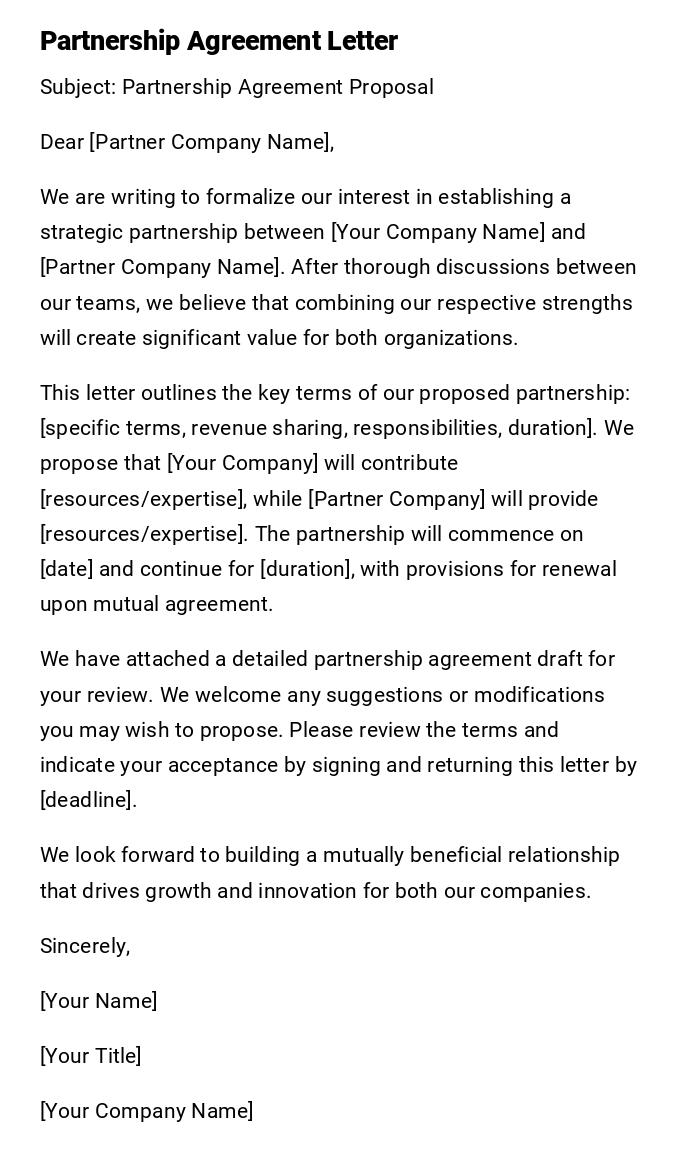
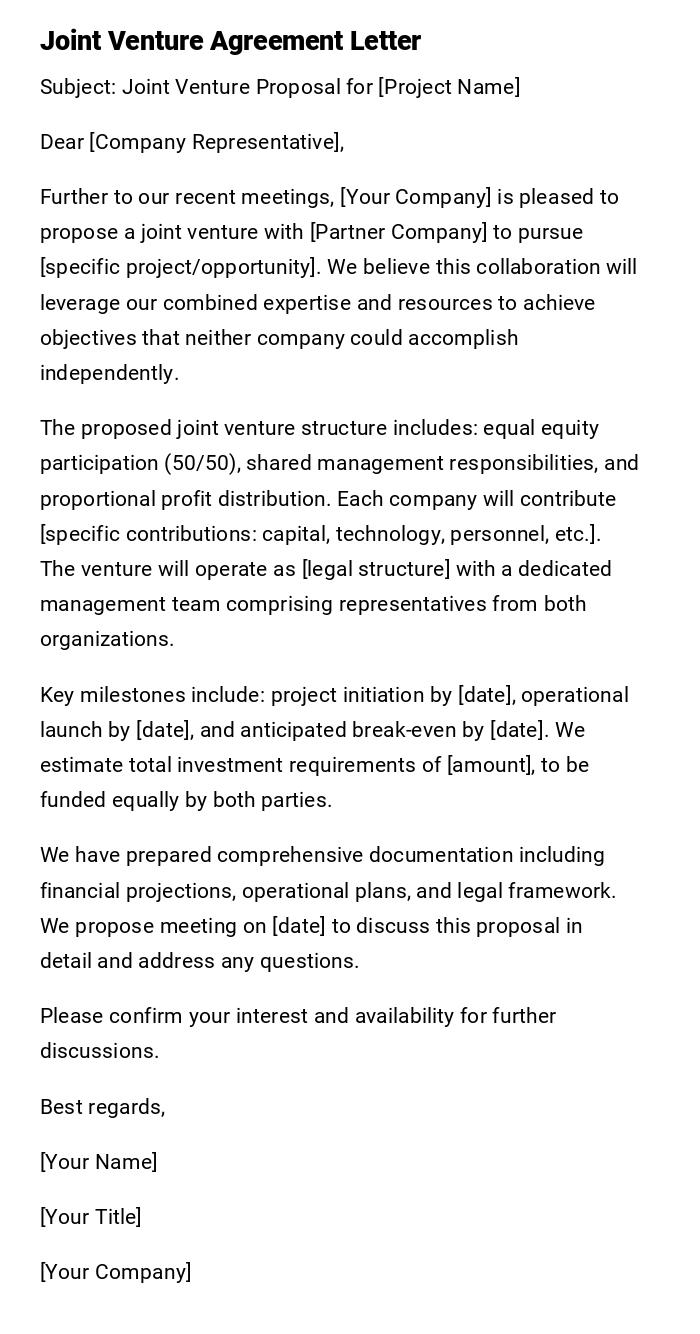
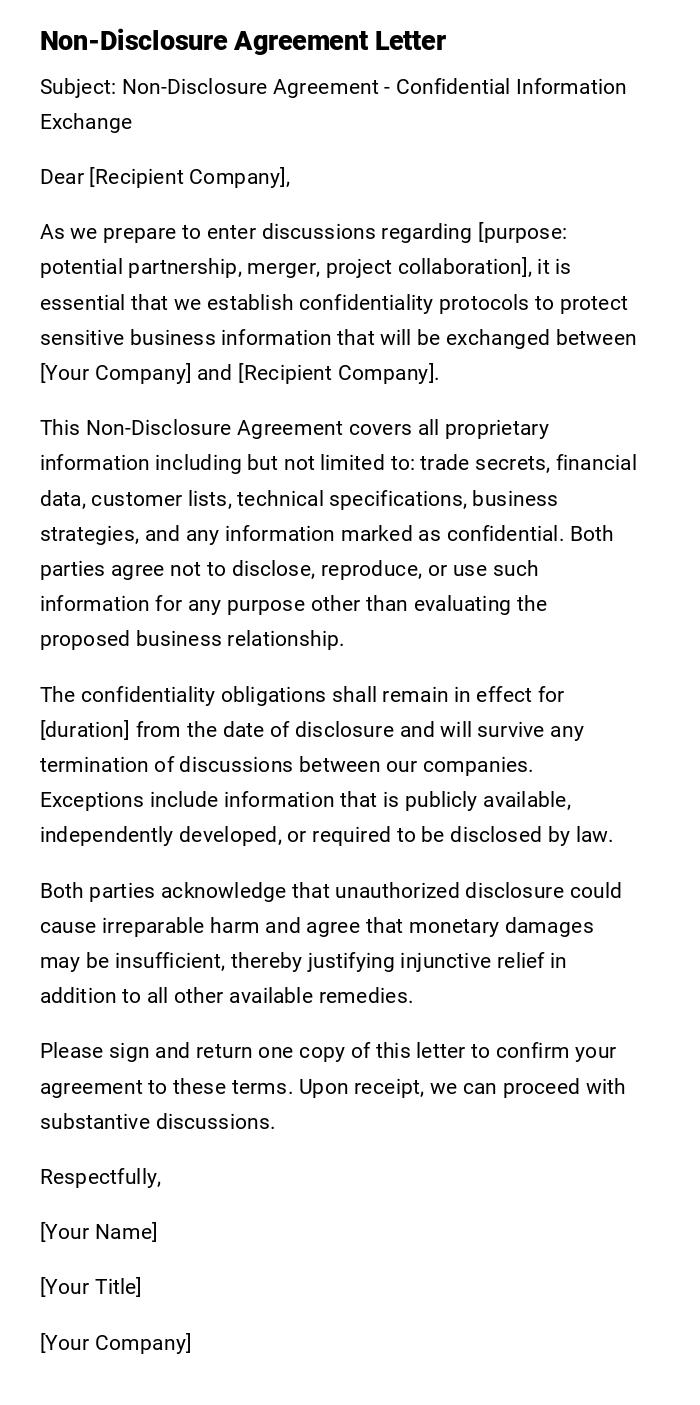
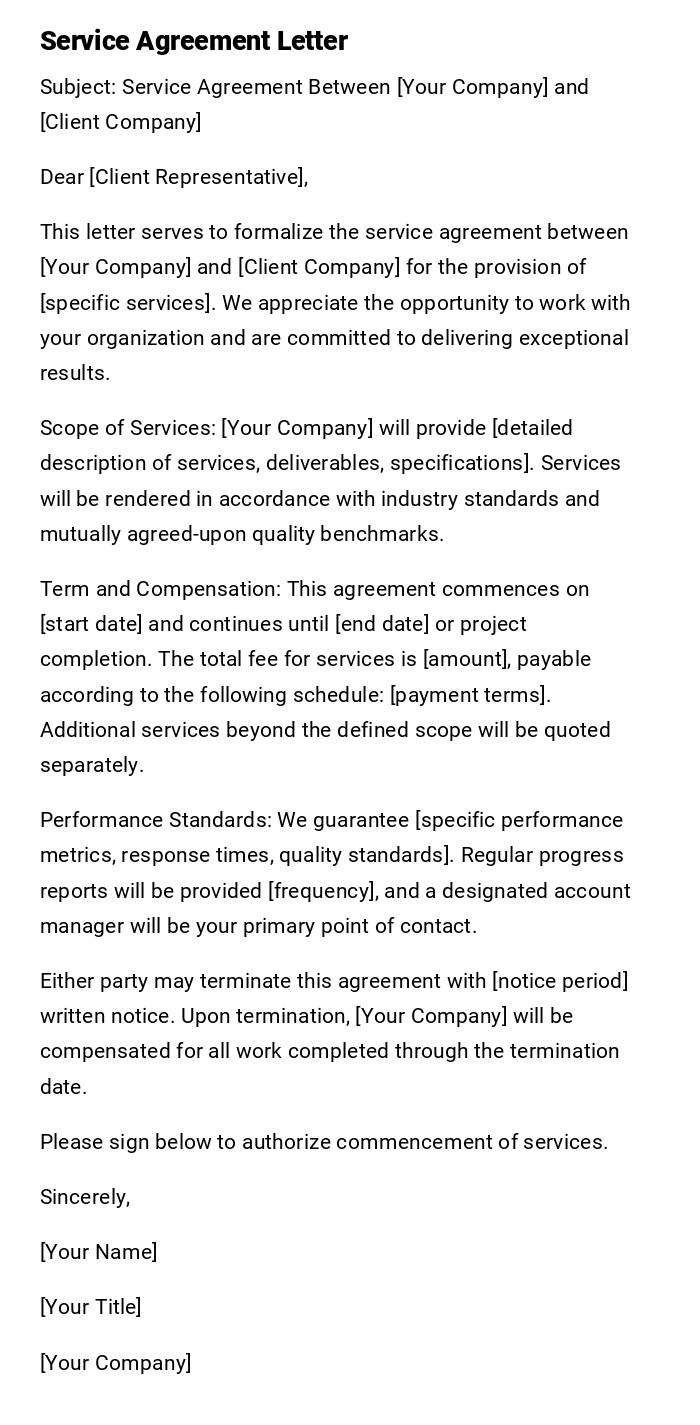
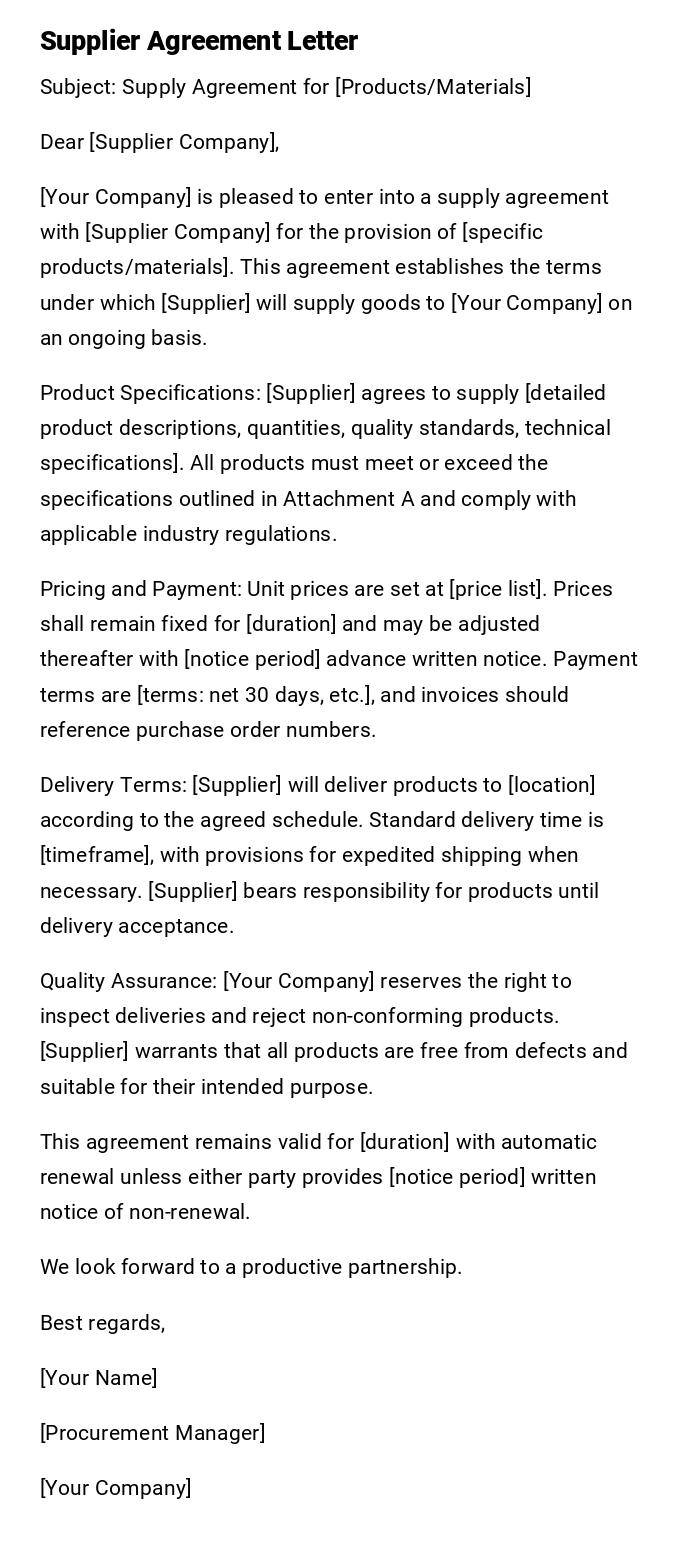
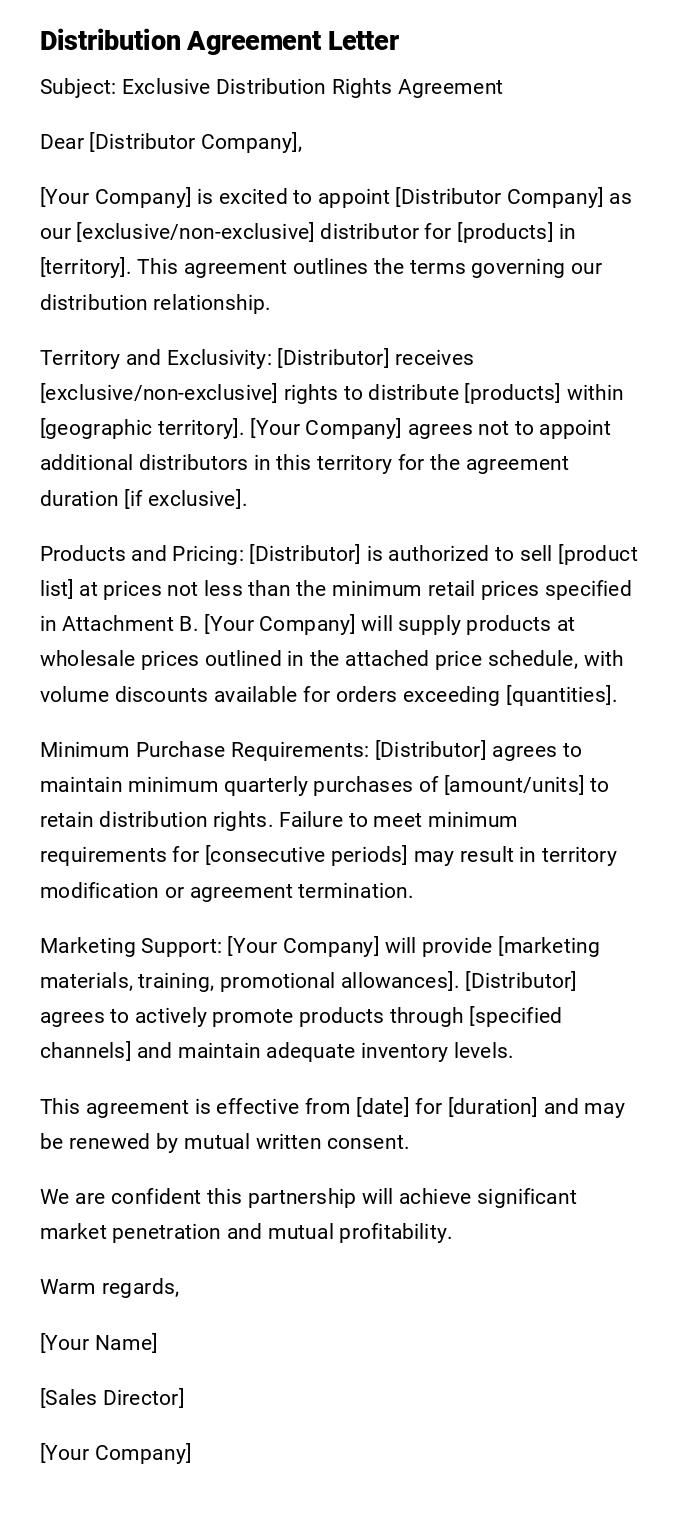
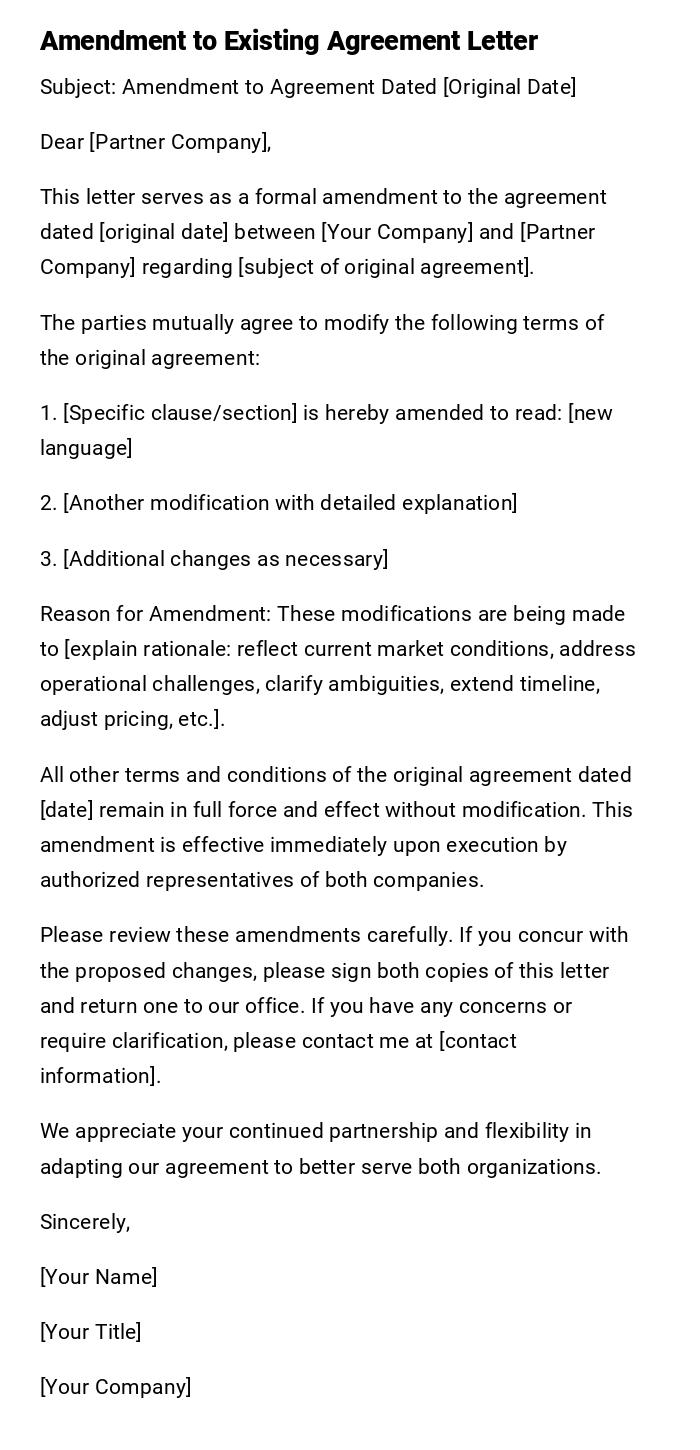
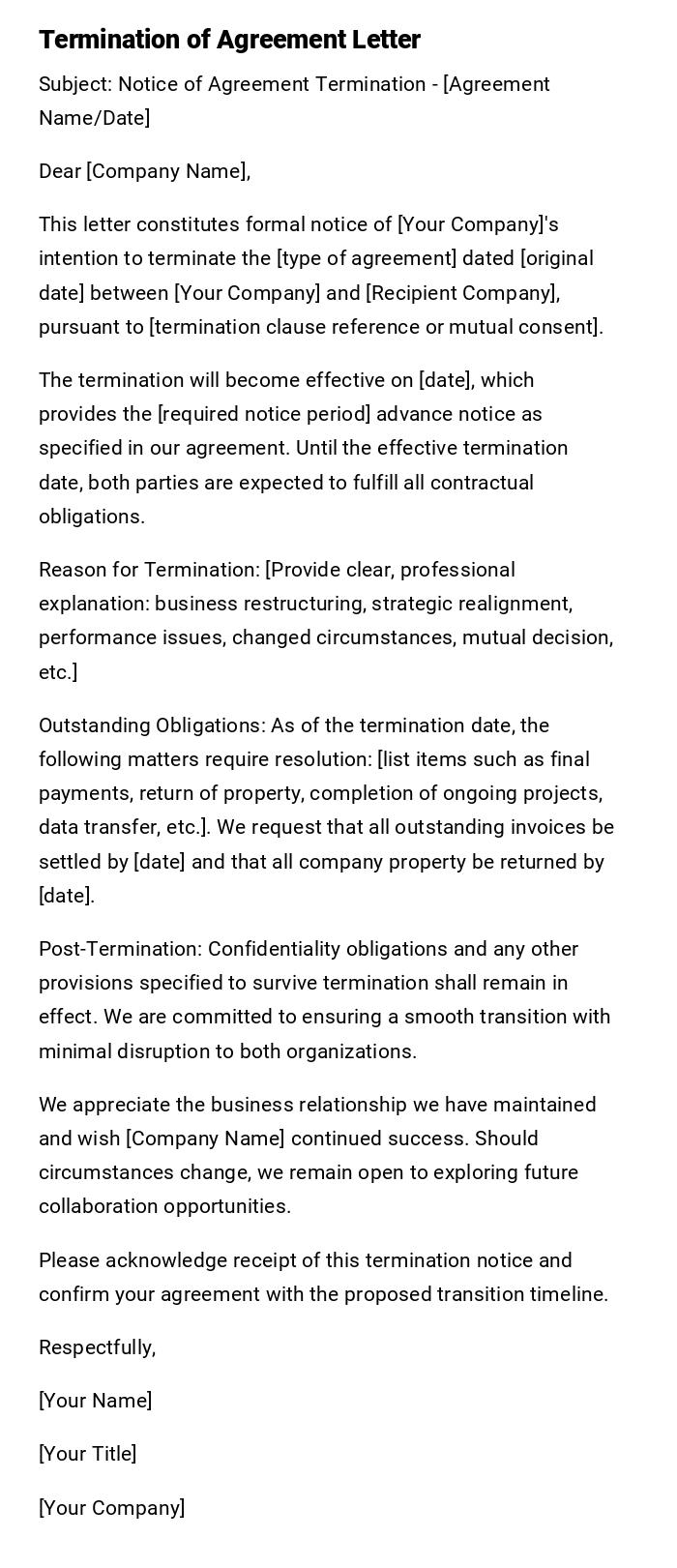

 Download Word Doc
Download Word Doc
 Download PDF
Download PDF